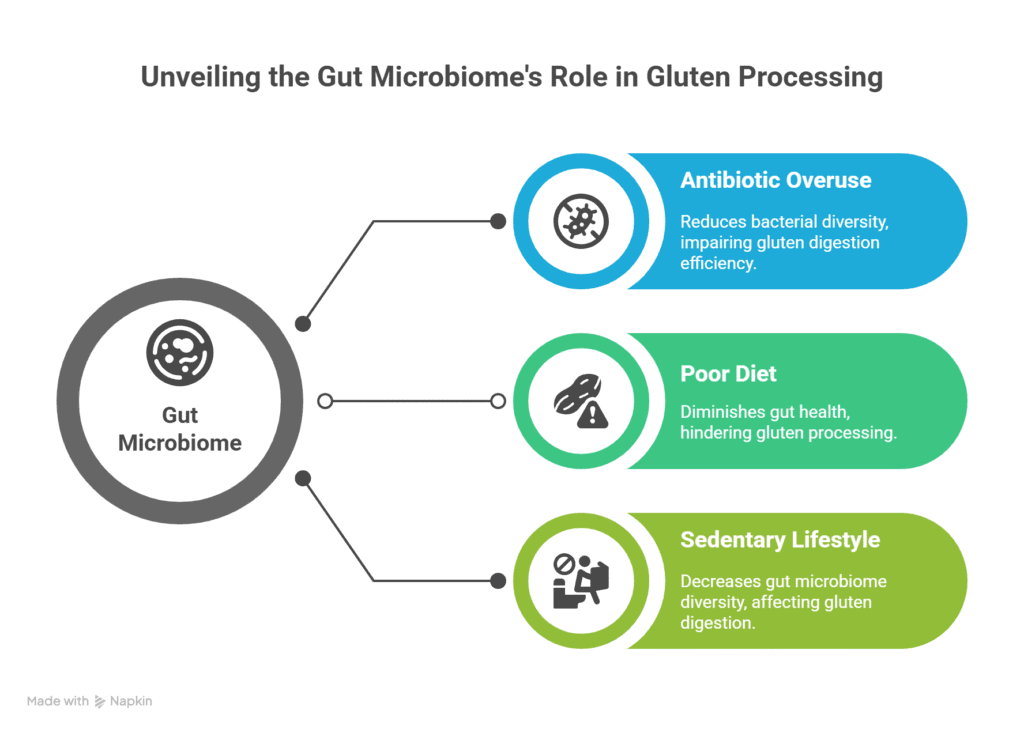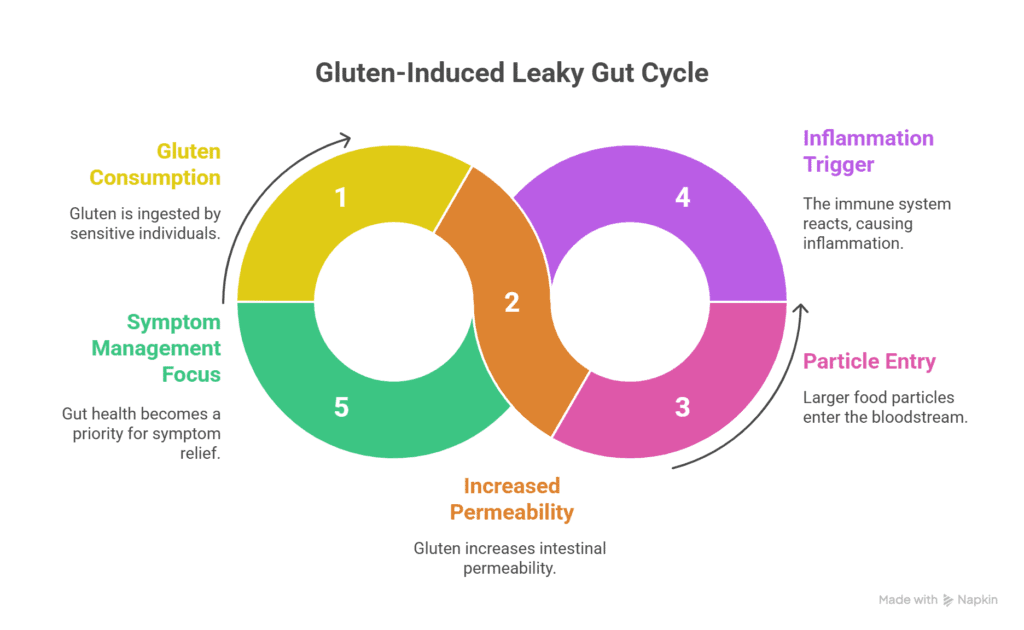Why Gluten Sensitivity Is on the Rise: Beyond Celiac Disease

The Rise of Gluten Sensitivity in Modern Diets
Did you know that nearly one-third of North Americans are trying to reduce or avoid gluten? What was once a niche dietary restriction for people with celiac disease has now become a mainstream lifestyle choice. But this shift isn’t just about celiac disease anymore — non-celiac gluten sensitivity (NCGS), food technology changes, and lifestyle factors are all playing a role.
For those new to the topic, you might want to read: What Is Gluten? or Beginner’s Guide to Gluten-Free Eating to better understand the basics.
How Better Testing and Awareness Are Uncovering More Gluten Sensitivity
Improved Diagnostics for Celiac and NCGS
Medical advancements in celiac disease testing and gluten intolerance diagnosis have led to higher detection rates. Previously, many cases went undiagnosed or were mislabeled as general digestive issues. Now, with more accurate blood tests, biopsies, and elimination diet protocols, more people are being correctly identified as gluten sensitive.
Public Education & Symptom Awareness
Social media, advocacy groups, and healthcare campaigns have made it easier for people to recognize symptoms like bloating, fatigue, and skin rashes. Increased awareness means more individuals are seeking testing and adjusting their diets accordingly.
Internal link opportunity: Signs and Symptoms of Gluten Intolerance
Has Modern Wheat Changed? The Role of Food Processing in Gluten Sensitivity
Modern Wheat Varieties
Over the past century, wheat has been selectively bred for higher yields and pest resistance. Some researchers believe these modern wheat varieties may have subtle gluten protein changes that could impact digestibility for certain individuals.
Industrial Baking & Additives
Gone are the days of slow, natural fermentation. Modern bread-making often involves quick-rise yeasts, chemical additives, and gluten-boosting ingredients to speed up production. This shorter fermentation may mean gluten proteins are less broken down before consumption, potentially making them harder to digest.
Hidden Gluten in Everyday Products
Gluten isn’t just in bread and pasta — it hides in sauces, soups, meat substitutes, and even cosmetics. This means people may be consuming far more gluten than they realize, making symptoms harder to pinpoint.
Internal link opportunity: Hidden Sources of Gluten You Might Miss

What Is Non-Celiac Gluten Sensitivity — and Is It the Same as Gluten Intolerance?
Recognition of NCGS
Non-celiac gluten sensitivity is recognized in people who don’t test positive for celiac disease or wheat allergy but still react poorly to gluten-containing foods.
Possible Causes
The exact cause is still being studied. Hypotheses include immune system involvement, gut permeability, and reactions to other wheat components such as amylase-trypsin inhibitors.
The FODMAP Factor
Many digestive issues blamed on gluten may actually stem from FODMAPs, a group of fermentable carbs found in wheat (such as fructans). A low FODMAP diet can sometimes relieve symptoms even when gluten is not the main trigger.Internal link opportunity: Low FODMAP Diet Guide or Foods to Avoid on a Low FODMAP Plan
Gut Health, Microbiome Changes, and Gluten Sensitivity
Impact of Antibiotics, Diet, and Lifestyle
Our gut microbiome — the community of bacteria living in the digestive tract — plays a key role in how we process gluten. Antibiotic overuse, poor diet, and sedentary lifestyles can reduce bacterial diversity, making digestion less efficient.

Inflammation & Leaky Gut
In some sensitive individuals, gluten may increase intestinal permeability (also known as “leaky gut”), allowing larger food particles to enter the bloodstream and trigger inflammation. This connection between leaky gut and gluten is one reason why gut health is a top focus for symptom management.

Internal link opportunity: How to Improve Gut Health Naturally
Why the Gluten-Free Diet Trend Is Growing (Even for Non-Celiac People)
Celebrity Endorsements & Wellness Culture
From Hollywood actors to fitness influencers, gluten-free diets have been promoted as a path to better health, even for those without medical gluten issues. This has contributed to the rise of gluten-free product lines in supermarkets and restaurants.
The Nocebo Effect
Some people feel worse after eating gluten simply because they expect it to cause symptoms. This nocebo effect shows how powerful the mind-body connection can be in perceived food reactions.
Internal link opportunity: Pros and Cons of a Gluten-Free Diet
Environmental & Societal Factors Influencing Gluten Sensitivity
Stress & Lifestyle Pressures
High-stress living can directly affect digestion and immune function. Chronic stress can slow digestion, increase inflammation, and alter gut bacteria — all of which may amplify gluten sensitivity.
Changes in Food Supply & Global Diet Patterns
Wheat has become a dominant ingredient worldwide, often in highly processed forms that include preservatives, additives, and hidden gluten. This higher exposure may explain why more people notice symptoms today than in previous generations.
Internal link opportunity: Hidden Sources of Gluten You Might Miss
Summary & Key Takeaways
Gluten sensitivity is more than a passing trend — it’s a complex interplay of genetics, diet, gut health, and environmental factors.
Key points to remember:
- Gluten reactions can come from celiac disease, wheat allergy, or NCGS.
- Modern wheat varieties and rapid industrial processing may be harder on digestion.
- Gut microbiome shifts, inflammation, and intestinal permeability play a role.
- Social influence and dietary trends have increased gluten-free adoption.
- Environmental stress and processed food supply may amplify sensitivity.
Final thought: If you suspect gluten is affecting your health, work with a healthcare professional for proper testing and guidance before making long-term dietary changes.
Internal link opportunity: Pros and Cons of a Gluten-Free Diet
Here’s a five-question FAQ section you can place at the bottom of your blog to complement the “Why Is Everyone Suddenly Sensitive to Gluten?” article.
FAQ: Gluten Sensitivity Explained
1. How is gluten sensitivity different from celiac disease?
Celiac disease is an autoimmune disorder where gluten triggers immune damage to the small intestine. Gluten sensitivity (non-celiac gluten sensitivity or NCGS) does not cause this intestinal damage, but can still produce symptoms like bloating, fatigue, and brain fog. Both conditions improve on a gluten-free diet, but their underlying mechanisms are different.
2. Can you develop gluten sensitivity later in life?
Yes. People can tolerate gluten for years before developing sensitivity. Factors like gut microbiome changes, chronic inflammation, gastrointestinal infections, or environmental triggers can prompt new or worsening reactions to wheat proteins.
3. Is modern wheat really worse than it used to be?
Some studies suggest that modern wheat breeding and food processing methods may have changed the way our bodies handle wheat, possibly increasing irritants like certain proteins or FODMAPs. However, research shows gluten levels themselves haven’t changed dramatically—the bigger difference may be in how often and in what form we consume it.
4. How do I know if gluten is the cause of my symptoms?
The most reliable approach is to speak with a healthcare provider and undergo appropriate tests before removing gluten from your diet—especially to rule out celiac disease. An elimination diet, followed by a monitored reintroduction of gluten, can help determine if symptoms improve without it.
5. Is a gluten-free diet healthy for everyone?
Not necessarily. While essential for those with gluten-related disorders, a gluten-free diet can be lower in important nutrients like fiber, iron, and B vitamins if it relies heavily on processed gluten-free substitutes. Whole, naturally gluten-free foods—like fruits, vegetables, rice, legumes, and quinoa—are healthier options.
